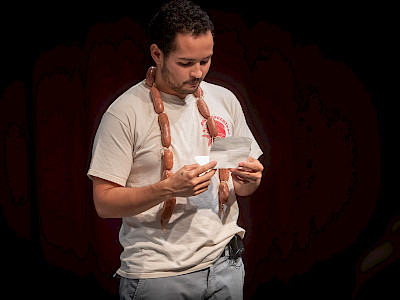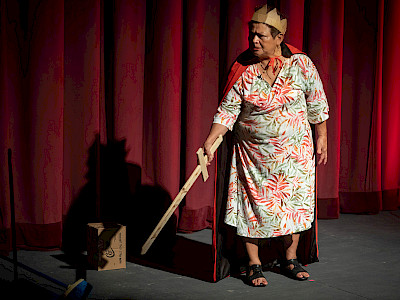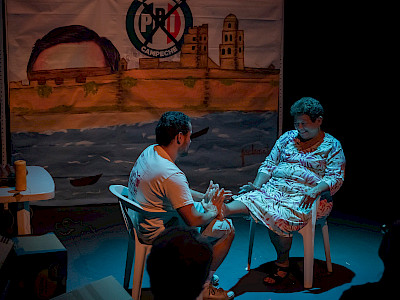15 — 20.05.2025
Over six decades, from 1960 to 2020, Josefina Orlaineta, mother of Anacarsis Ramos, worked more than forty jobs in Campeche, southern Mexico, while Anacarsis left to pursue theatre in Mexico City and fully embrace his identity as a gay man. Now, in Mi madre y el dinero, they explore Josefina’s long relationship with money, blending economic reflection with theatrical fiction. First, they revisit Josefina’s many jobs, revealing her sales techniques as a microcosm of her unconscious acting in daily life. On stage, they stuff sausages; as if filling the scenes with memories.
At the same time, the performance becomes a continuous investigation of theatre itself: Ramos mocks Europeans’ appetite for documentary theatre and the importance given to having his mother embody herself on stage. Together, they question whether the precarious life of theatre is truly so different from Josefina’s past. The repartition of knowledge—so often tied to class—is reversed when Josefina imagines creating video tutorials for young artists on surviving financial difficulties. Reconstructing moments in their lives with striking simplicity, Mi madre y el dinero delicately reflects on class shame, how work intrudes into family spaces, and the intricate negotiations of telling someone else’s story.
Extraits from the logbook
3 May 2023
Too much gloom. Failing again in the sixties. Losing again. Understand that we will never get to be calm. That we will age badly. And that we never could earn money. Despite every effort. You always end up being more stupid than the
money. And there are always some who are smarter. Today, I met my mother’s sorrow again.
At some time in May 2023
I have gone back to work with my mother again, after eight years of not doing so. What started as something sad (I returned to Campeche because the money I was earning in the theatre wasn’t enough to live on) has been transformed into something beautiful and intimate. In the afternoon, I help her to tie up the sausages, and while we work, she tells me about all the businesses she’s had. More than forty jobs! Why have I forgotten all this?
28 May 2023
The times we work together are the few moments in the day when we aren’t arguing.
3 July 2023
I have that feeling that literature covers the objects turning around themselves, so it can then turn around itself. I cannot pay attention to this process from here.
At some time in March 2024
As far back as I can remember, everything good that happened in my family was the result of a miracle: an external intervention that saved us after great trials, a providential sale five minutes before the shop closed, an inheritance from a Spanish grandmother, and all her little favours. I even feel that my whole life is a bit like that. That I depend too much on the generosity of others. From the call that gives me a job, or the letter that informs me they are programming my work. I don’t pray like my mother did, but deep down I am asking for my desires all the time.
24 April 2024
The shelves in the shop can work as a space, that encapsulates the various economic stories. On the one hand, they contain the traces of the personal economic paths: prosperity-scarcity. On the other, they reflect the needs and the trends of the customers, a picture of the world. And they give this sense of transparency hoped for in business. What are we selling in this job?
13 May 2024
While we were rehearsing, you asked me if at any point in the play you could say that you’d had a shitty life.
1 June 2024
In Campeche, there are only two seasons: the dry period and the rainy period. There should be a scene about storms. Something that links them to the crisis. Their frequency. The way in which we expect them. I have this memory of when the shoe shop flooded. A metre of water. A swimming pool full of shoes.
12 June 2024
I am tired. I have wanted to do this project for so long. And now, just when we are starting to rehearse, my heart is broken, and I have so little desire to get out of bed. However, they have already given us an advance, and the product has to be delivered. It must be done. But I still can’t make sense of so much work and suffering on the part of my parents. What can I say about all this? I write these scraps, these notes, as if I were tying sausages. And in the end, perhaps I’ll present them like that, one long strip of flesh and narrative, cut into pieces.
24 June 2024
Today we dealt violently with each other, and I asked my mother that we stop this creative process. That from now on, we would only rehearse the scenes we already have, but we would not continue trying to write new ones as long as we had no more money. Our worlds that had managed to be reconciled for a while, with disagreements suspended through this work, were being revealed again as if in opposition, and we are moving away from each other into confrontation. In the end, it’s all about money, isn’t it? I feel terrible because I cannot offer anything different to the way we’ve always lived, but also in the end I understand the role that money always played in our violence.
4 July 2024
First rehearsal in the theatre of the work in progress. A vast, beautiful theatre. And it makes me so happy to see my mother in the centre of it. Some of my confidence in this project is returning.
15 July 2024
She is a diva. And like all the divas, she hates the rehearsal process and loves the roles.
5 October 2024
Today we were having a discussion, when I asked her what was her idea of utopia. Every idea I gave her about utopia seemed stupid to her. Like, a future where no-one would work. I told her she could imagine anything she wanted. And this annoyed her. Later on, Babis told me that her reply was that utopia cannot be imagined. And I refused to listen.
20 October 2024
I told my mother that we would have to do some other work together on the whole subject of my father. Because there’s too much of it to be included in this. And she asked me that first, we have to see how we’re going with this, and then we’ll see. She’s right.
21 October 2024
I know that some of her depression remains in me, and I understand that on Sundays when it rains, I know that neither do I see my life as unsatisfactory. The only thing that seems to save us is work. We don’t know how to do anything else. And calling people to work with us has become the only way that we have to keep us close.
25 October 2024
I am grateful that Santi helps us to mediate between the moments when it helps that we are mother and son, and the moments we have to behave like actor and director. I think that we are now communicating better, thanks to the theatre.
4 November 2024
She told me about the time they went out to sell foam chickens in Tenerife. And it made my father ashamed that his family should recognise him trading in the street; then she thought it would be a good idea to dress up as clowns, since the carnivals were coming. That night they sold nothing, and the holiday came and it turned out the big festival was in a different town. I don’t know if this should be in the work, we are showing it and it continues to cause pain. We have to find a different medium, perhaps. But there is something in this story that calls to me. As if in imagining them in the middle of this holiday, trading, with the clown’s make-up to hide their shame, I might understand my own heritage.
- Anacarsis Ramos, April 2025
- Translated by Joanna Waller
Presentation: Kunstenfestivaldesarts, Kaaitheater
Creation: Anacarsis Ramos / Pornotráfico | Based on Josefina Orlaineta’s life account | Directing, writing and set design: Anacarsis Ramos | Cast: Josefina Orlaineta, Anacarsis Ramos | Dramaturg, assistant director and prompter: Santiago Villalpando | Research: Babis Zozaya | Video, lighting and sound design: Karla Sánchez “Kiwi” | Producer, set building and props: Fausto Castaño | Scenic painting: Josefina Orlaineta | Prompter and acting coach in Campeche: Sofía León | Production assistant in CDMX: Valentina Girón | “Vlogger” recording assistant: Emiliano Sandoval
Production: Festival Internacional del Centro Histórico de Campeche, Instituto de Cultura del Estado de Campeche | Coproduction: FULGOR - Encuentro escénico con los Estados 2024 curated by Mariana Arteaga and Mariana Gándara




